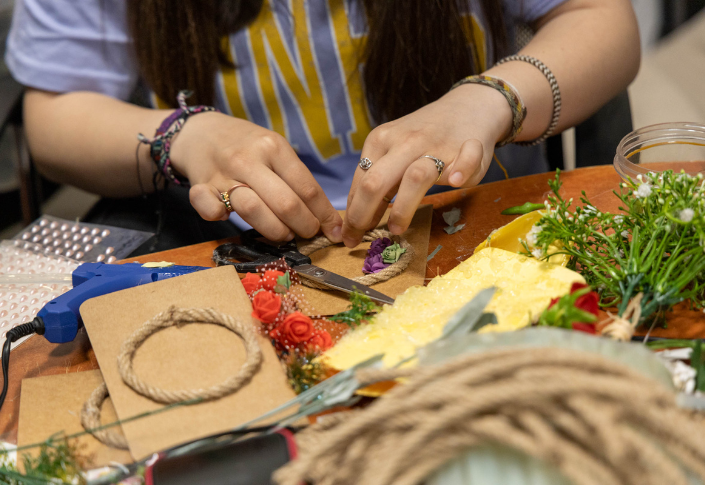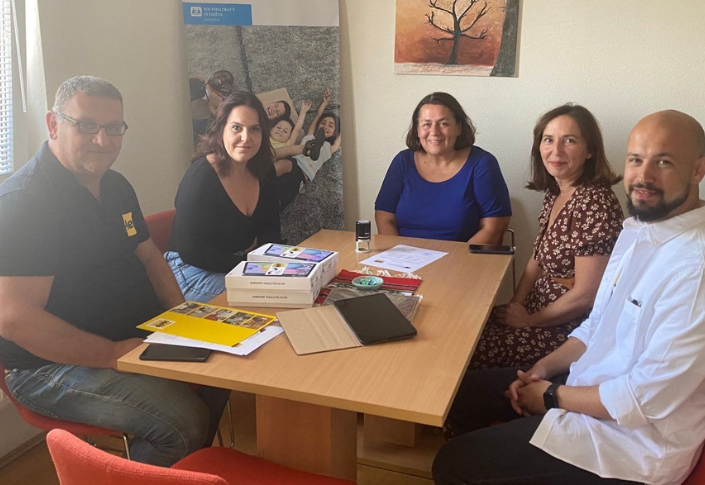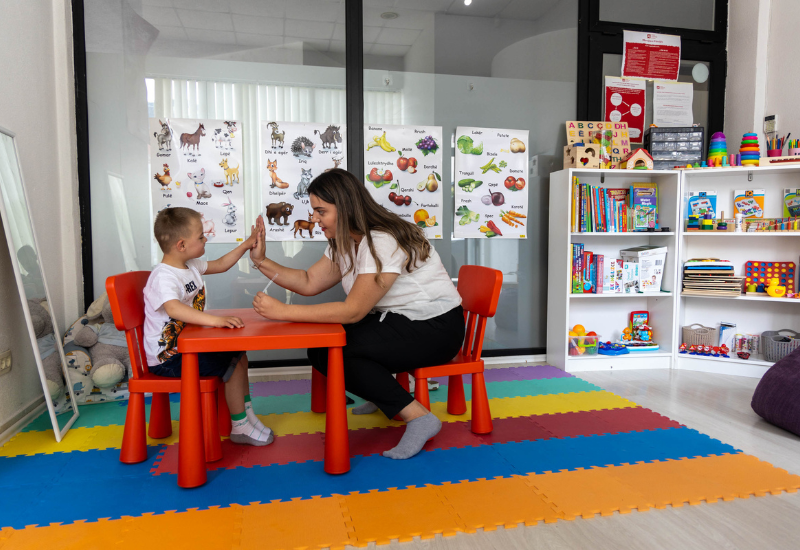World Children's Day has been celebrated around the world every November 20 since 1959, when the United Nations General Assembly adopted the Declaration on the Rights of the Child, and then, on the same date, thirty years later, in 1989, adopted the Convention on the Rights of the Child.
World Children's Day has been celebrated around the world every November 20 since 1959, when the United Nations General Assembly adopted the Declaration on the Rights of the Child, and then, on the same date, thirty years later, in 1989, adopted the Convention on the Rights of the Child.
This day is an opportunity to remember children’s rights, draw the public's attention to the obligation we as a community have towards them, and work together to improve the position of children, especially those who belong to vulnerable and sensitive groups.
To mark World Children’s Day, we analyzed data on how Kosovo supports children directly, as well as organizations dedicated to helping them, by showcasing inspirational stories of philanthropic actions directed towards the betterment of the lives of children in Kosovo.
Philanthropic donations in the first ten months of 2023
From January 1 to October 31, 2023, citizens and companies donated 8,054,255 euros to support the communities and improve their lives in Kosovo. Most of the donations (78.7%) were provided once and with a short-term support effect, whereas 18.9% were donated strategically which had a long-term support effect, while 2.39% of donations could not be categorized as having a specific intended effect.
Talking about donors – domestic support was predominant – according to Giving Kosovo philanthropy platform data, 76.1% of donations came from within Kosovo, while 23.9% were support from the diaspora. The data also show that 30.5% of instances of giving were coming from mass-individual, 33.1% from other sources, 6.18% support came from private foundations, 8.17% came from corporate giving, 21.1% from the support of individuals, and 0.9% was a combination of donations from mixed donors.
Donations channeled in support of children during this period
According to the data collected by the Giving Kosovo philanthropy platform, in the first ten months of the current year, 172,088 euros were donated to support children and youth. Donations were directed to nonprofits in 50% of instances of giving, individuals and families received 33.3% of the support, and public institutions 16.7%.
The most active donors were citizens through mass-individual giving – they participated in 41.7% of donation instances. The corporate sector provided 25% of the support; individuals contributed with 16.7%; other donors participated in 8.33% of philanthropic actions and mixed in 8.33%.
Half of the donations were one-off support with a rather short-term effect of support (50%), 33.3% had long-term effects, and for 16.7%, we could not identify the effects of giving. The same data show that 8.33% of donations intended to support children coming from the diaspora, while 91.7% are from within Kosovo.
In the Giving Kosovo Philanthropy Platform, we categorize children and youth without parental care as a special category, and we looked into the data on how Kosovo supported them. From January 1 to October 31, 22,417 euros were donated to support children and youth without parental care. The help was distributed through nonprofits in all (100%) of the cases.
The data has shown that the most active donors were individuals who contributed in 40% of donation instances. Other donors contributed in 20% of philanthropy actions; citizens, through mass-individual giving, contributed in 20% of the instances, and the corporate sector also in 20% of the donation instances. Over half of the donations for children and youth without parental care were long-term support (60%), while 40% of actions were one-off, which we consider shorter-term support. The diaspora contributed with 20% of philanthropic actions for children without parental care, while the donors from Kosovo participated in 80% of the donations.
In the rest of the article, we will showcase some inspirational stories on how citizens and companies in Kosovo have supported different categories of children through their philanthropic actions.
Embracing Differences: Support for “Down Syndrome Kosova”

The process of creating postcards in the office of "Down Syndrome Kosova"; Photo credit: Arbër Gjoni
“Down Syndrome Kosova” is a well-known association dedicated to promoting, respecting, and protecting the rights of children and adults with Down Syndrome in Kosovo and their family members. They have developed a network of donors and supporters.
This association raised more than 53,588 euros during the "A postcard for you" action within the "With us, not for us" campaign, marking World Down Syndrome Day on March 21, 2023. Corporates, SMEs, CSOs, individuals, and beyond joined the campaign by purchasing postcards made by the community of people affected by Down Syndrome, through which purchase support is provided for therapeutic and psycho-social services for people with Down Syndrome.
Among the companies that supported the campaign were the retail chain in Kosovo, “Viva Fresh Store,” and the educational institution “PBC Academy.” Both companies bought 1,000 postcards each from “Down Syndrome Kosova” to support the cause.
Another company that supported this association is the “Meridian Express” company. They signed a cooperation agreement whereby the “Meridian Express” company will provide financial support to cover the therapeutic services for two children affected by Down Syndrome for a period of one year each. These services will be provided by “Down Syndrome Kosova,” as they have the specialized expertise within the organization.
Nurturing Hope: Support for Children without Parental Care
Since 1999, “SOS Children's Villages” in Kosovo has been working to provide a loving home for every child without parental care by caring for these children and empowering them and the families in need. With the great support of their community, this organization helped and empowered more than 1,500 children thus far. Some of the newsworthy donations that have supported the organization in its efforts to provide loving homes for children without parental care are as follows:
- The donation in the amount of 16,666 euros from “NLB Bank Kosovo.”
- The donation of technological equipment from “Help in Kosovo,” an internationally initiated organization that supports people towards self-reliance.
- The donation of 500 euros from the Mulaku Family from Vushtrria.

The donation of “Help in Kosovo” for the “SOS Children's Villages” in Kosovo; Photo credit: “SOS Children's Villages” in Kosovo official “Facebook” page
Investing in Children's Health: Donations to the Pediatric Clinic
The Department of Cardiology at the Pediatric Clinic of the University Clinical Center of Kosovo (UCCK) has received a donation from the Association of Microfinance Institutions of Kosovo – AMIK. The donation was initiated and carried out by AMIK in cooperation with the Association's member microfinance institutions, such as Kosovo Financing Agency (AFK), FINCA Kosovo, KEP Trust, Kosovo Rural Credit (KRK), and KosInvest. The donation was provided for the renovation of the Cardiology Department at the Pediatric Clinic and the purchasing of the needed equipment by this Department to be more supportive for the young patients of this clinic.
Healing Hope: Donations for Medical Care
The community in Kosovo often supports adults and children with health challenges. Hence, we highlighted some stories showing the support provided for children who need expensive medical treatments.
A group of individuals organized themselves in Ferizaj Square and asked for the support of well-known rapper Gramoz Aliu–Mozzik with the goal of collecting donations to support the medical treatment of R.K., a young girl from Ferizaj in Turkey. Thanks to this initiative, the total amount of 137,384 euros was raised in just three days, exceeding the initial goal. In addition to private donations from individuals, a number of diverse businesses supported this philanthropic action. The total cost of the treatment for R.K. is 110,000 euros; the remaining donations collected 27,384 euros will be passed as a donation to other individuals in Kosovo who are in need of support in getting medical treatments.
Conclusion
The importance of supporting children every day, not just on designated occasions like World Children's Day, lies in the recognition that their well-being is a continuous and evolving journey.
Children are the architects of our collective future, and by offering consistent support, we provide them with a foundation upon which they can thrive emotionally, intellectually, and physically. Daily support ensures a stable and nurturing environment, fostering a sense of security and belonging crucial for their development. By embracing the significance of day-to-day care, we affirm our commitment to creating a world where every child has the opportunity to grow, learn, and flourish, regardless of the date on the calendar. It is in the routine acts of kindness, encouragement, and investment in their potential that we truly make a lasting impact on the lives of children, shaping a brighter, more compassionate future for generations to come.
We hope that our stories inspired you to help the children in your community.
If you want to know more about donations provided to children in Kosovo, you can access the database Giving Kosovo and analyze the data yourself.
Want to know more about philanthropy and donations in Kosovo? Check out our report on the state of philanthropy - Giving Kosovo 2022.
This article is made possible by the generous support of the American people through the United States Agency for International Development (USAID). The contents are the responsibility of Catalyst Balkans and do not necessarily reflect the views of USAID or the United States Government.
The Citizen Engagement Activity in Kosovo is a five-year initiative implemented by Kosovar Civil Society Foundation (KCSF) in partnership with the United States Agency for International Development (USAID).
Cover photo source: Arbër Gjoni

